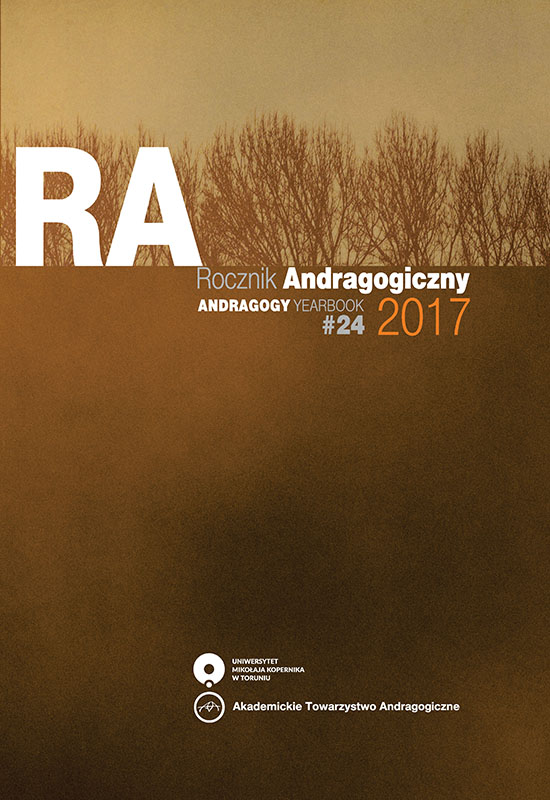Medication use in the elderly – the need for health education
DOI:
https://doi.org/10.12775/RA.2017.015Keywords
aging, health education, medication use, addictionAbstract
Worldwide tendency of a rising life expectancy among populations, resulting in an increase of the retired in the demographic structure, makes the senior health education an extremely important issue. Insufficient preparation to prevent and cope with multiple health threats associated with aging indicates an urgent need to increase seniors’ knowledge and skills in the area of health. The paper aims at depicting geriatric pharmacotherapy that entails medication abuse and dependency among the elderly, both resulting in serious problems of medical, psychological, and sociological nature. Educating on both negative and positive aspects of aging, as well as the pharmaceutical use are essential considering the lack of proper health care policy for the elderly.
References
Anderson G., Kerluke J. (1996), Distribution of prescription drug exposures in the elderly: description and implications, „J Clin Epidemiol”, 49, s. 929–935.
Główny Urząd Statystyczny (2014), Prognoza ludności na lata 2014–2015, Zakład Wydawnictw Statystycznych, Warszawa.
Główny Urząd Statystyczny (2011), Rocznik demograficzny 2011, Zakład Wydawnictw Statystycznych, Warszawa.
Gossop M. (2008), Zażywanie substancji przez osoby starsze: zaniedbywany problem, „Cel – Narkotyki”, nr 18, Urząd Oficjalnych Publikacji Wspólnot Europejskich, Europejskie Centrum Monitorowania Narkotyków i Narkomanii.
Haighton C., Wilson G., Ling J. i wsp. (2016), A qualitative study of service provision for alcohol – related health issues in mid to later life, „PLoS One”, 11 (2): e014601.
Halicki J. (2010), Obrazy starości rysowane przeżyciami seniorów, Wydawnictwo Uniwersytetu w Białymstoku, Białystok.
Korzeniowska K., Cieślewicz A., Zasadzka E., Borowicz A., Pawlaczyk M., Jabłecka A. (2015), Analiza problemu uzależnień w grupie osób w wieku podeszłym, „Przegląd Lekarski”, 72(3), s. 111–114.
Ksiądzyna D., Szeląg A. (2013), Specyfika farmakoterapii pacjentów w podeszłym wieku, „Psychogeriatria Polska”, 10(3), s. 115–126.
Kwiatkowski M., Wygnał N., Simonienko K. i wsp. (2017), Uzależnienie od leków w populacji osób starszych, [w:] Cybulski M., Krajewska-Kułak E., Kędziora-Kornatowska K., Waszkiewicz N. (red.), Psychogeriatria, PZWL, Warszawa.
Lochner K.A., Cox Ch.S. (2013), Prevalence of Multiple Chronic Conditions Among Medicare Beneficiaries, United States, „ Prev Chronic Dis”, 10, s. 120–137.
Pieprzyk M., Pieprzyk P. (2012), Osoby starsze w systemie ochrony zdrowia, „Ruch Prawniczy, Ekonomiczny i Socjologiczny”, 3, s. 175–188.
Wolański N. (2005), Rozwój biologiczny człowieka, Wydawnictwo Naukowe PWN, Warszawa.
Storr C.L., Green K. M. (2014), Progression form Substance Use to the Development of Substance Use Disorders, [w:] Crome I., Wu L.T., Rao R.T i wsp. (red.), Substance Use and Older People, Wiley – Blackwell, Hoboken.
Szymborski J., Iwińska K., Przewoźniak K., Błaszczyk K., Troszyński M., Szylar A. (2014), Interdyscyplinarna szkoła promocji zdrowia seniorów, Collegium Civitas, Warszawa, s. 39.
Wolff J.L., Starfield B., Anderson G. (2002), Prevalence, expenditures, and complications of multiple chronic conditions in the elderly, „ Arch. Int. Med”, 162, s. 2269–2276.
World Population Ageing Highlights (2015), Department of Economic and Social Affairs, United Nations, New York.
Downloads
Published
How to Cite
Issue
Section
Stats
Number of views and downloads: 1167
Number of citations: 0



